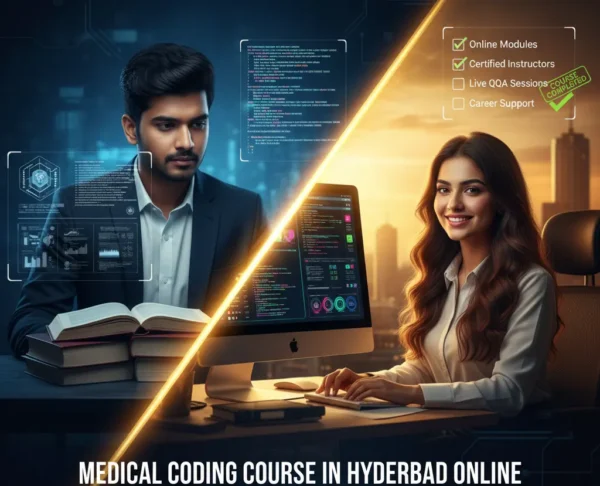CPC Exam Study Guide: Common Questions and Answers for Candidates

CPC Exam – Complete Guide for Medical Coding Students
The CPC exam is a crucial milestone for individuals aiming to establish themselves in the medical coding profession. With evolving healthcare standards, accurate coding has become more important than ever. For candidates preparing for this examination, having the right strategies, resources, and knowledge can make all the difference. This guide provides insights into the exam for candidates, highlighting preparation techniques, common challenges, and ways to enhance performance. Freshers can start their career with CPC medical coding training.
Understanding the CPC Exam
The Certified Professional Coder exam evaluates a candidate’s knowledge in medical coding across various healthcare settings. It covers ICD-10, CPT, and HCPCS Level II coding, as well as medical terminology, compliance regulations, and documentation guidelines. A clear understanding of the exam structure is the first step toward effective preparation.
-
- Exam Duration: 5 hours and 40 minutes
- Number of Questions: 150 multiple-choice questions
- Passing Score: 70%
Candidates should refer to the exam study guide for detailed information about exam sections, scoring, and rules.
Key Components of the CPC Exam
The exam guide for candidates emphasizes mastering several key areas:
-
- Medical Terminology: Understanding medical terms, anatomy, and disease classifications.
- ICD-10-CM Coding: Accurate coding for diagnoses based on clinical documentation.
- CPT Coding: Procedure coding for outpatient and inpatient services.
- HCPCS Level II Coding: Coding for supplies, equipment, and medications.
- Compliance and Regulations: Knowledge of HIPAA, fraud prevention, and ethical coding practices.
Strong performance in these areas requires consistent practice and reference to reliable study materials.
Effective Exam Preparation Strategies
Preparation is the backbone of success in the exam for candidates. Here are actionable tips:
-
- Create a Study Plan: Allocate time to each exam section and set milestones.
- Use a CPC course Exam Study Guide: Structured guides provide detailed explanations, examples, and practice questions.
- Practice Coding Scenarios: Apply coding principles to real-world cases to improve speed and accuracy.
- Review Common Errors: Learn from mistakes in practice questions to prevent them during the exam.
Combining these methods ensures a balanced approach, covering both theory and practical applications.
Utilizing Certified Professional Coder Exam Questions and Answers
Working with Certified Professional Coder exam questions and answers is essential for identifying strengths and weaknesses. Mock tests simulate real exam conditions, allowing candidates to practice time management and question interpretation. Students feel more prepared after a practice exam for CPC.
-
- Tip: Review each answer carefully, understand the rationale, and note recurring problem areas.
- Recommendation: Focus on sections where scores are lower during practice tests.
Candidates can find comprehensive resources through specialized programs like medical coding training in Ameerpet or medical coding training in Hyderabad.
Exam Tips and Strategies for Success
Success in the CPC test relies not only on knowledge but also on smart strategies. Solving a CPC question paper builds exam confidence.
-
- Flag Difficult Questions: Move forward and revisit challenging items later.
- Understand Coding Guidelines: Follow official coding manuals and guidelines meticulously.
- Stay Calm and Focused: Mental preparation is as important as technical knowledge.
- Time Management: Allocate time wisely across sections to avoid last-minute pressure.
Adopting these CPC exam tips and strategies for success improves confidence and reduces exam-day anxiety. Using a CPC question paper makes exam preparation more effective.
Leveraging Online and Classroom Resources
Candidates today have access to diverse learning methods. Combining virtual and traditional classes offers the best results.
-
- E-learning Options: Many Certified Professional Coder exam study guides are available online.
- Classroom Training: In-person sessions provide hands-on support and peer interaction.
- Integrated Programs: Institutes like medical coding training offer hybrid learning solutions.
These resources help candidates build a strong foundation and refine their coding skills effectively.
Importance of Continuing Education
Medical coding is constantly evolving. Reviewing a CPC question paper helps students know what to expect in the exam. Staying current is vital for long-term career growth. Many professionals pursue additional programs, such as pharmacovigilance training or pharmacovigilance courses in Ameerpet, to diversify skills and maintain certification relevance.CPC medical coding focuses on accurate medical code assignment.
-
- Regular Updates: Follow changes in coding guidelines and healthcare regulations.
- Advanced Certifications: Consider specialty certifications to enhance career prospects.
- Networking: Join coding communities to exchange insights and updates.
Common Mistakes to Avoid
Even well-prepared candidates can face challenges. Avoid these common pitfalls:
-
- Ignoring exam instructions
- Spending too much time on a single question
- Neglecting practice exams
- Failing to review key coding manuals
Awareness of these mistakes can improve overall performance and reduce stress.
Exam-Day Checklist
Preparation extends to exam day. Many learners use a practice exam for CPC to check their knowledge. Ensure the following:
-
- Bring valid identification and required materials
- Review last-minute key concepts without cramming
- Stay hydrated and maintain a positive mindset
- Arrive early to avoid last-minute stress
A well-planned approach to the exam day complements your preparation efforts. Taking a practice exam for CPC improves confidence before the real test.
Career Opportunities After CPC Certification
Many students choose the CPC certification to succeed in CPC medical coding jobs. CPC medical coding skills are in high demand. Passing the exam opens doors to numerous opportunities:
-
- Medical Coding Specialist: Hospitals, clinics, and insurance companies
- Coding Auditor: Ensures compliance and accuracy of coding practices
- Healthcare Consultant: Provides coding and compliance guidance
- Instructor Roles: Teaching aspiring coders in medical coding training in Ameerpet or medical coding training in Hyderabad programs
Certification demonstrates professional competence and enhances employability in a competitive field. Regular practice exam for CPC attempts improves accuracy.
Conclusion
The CPC online exam guide for candidates emphasizes structured preparation, practical practice, and strategic approaches to succeed. By leveraging exam study guide materials, reviewing CPC exam questions and answers, and following CPC exam tips and strategies for success, candidates can confidently approach the exam and advance their careers. Beginners benefit a lot from a practice exam for CPC.
For comprehensive training and support, Ikya Career provides expert-led programs, including medical coding training, pharmacovigilance training, and specialized courses in Hyderabad and Ameerpet. Explore these resources to take your coding career to the next level. A CPC question paper helps improve accuracy in coding answers. CPC medical coding becomes easier with proper CPC certification.
Frequently Asked Questions
-
- What is a CPC exam study guide?
An exam study guide is a resource that outlines exam content, provides practice questions, and helps candidates plan their preparation effectively. - How do CPC exam questions and answers help in preparation?
They allow candidates to practice real exam scenarios, identify weaknesses, and improve speed and accuracy. - Who should take the CPC exam for candidates?
Anyone seeking a professional career in medical coding, billing, or healthcare documentation can benefit from taking the exam. - What are the best CPC exam tips and strategies for success?
Focus on time management, practice coding scenarios, flag difficult questions, and maintain a calm mindset during the exam. - Is prior experience required before attempting the CPC online exam?
While coding experience helps, many candidates take formal training or study guides to build knowledge before attempting the exam. - How long is the exam of CPC for candidates?
The exam lasts 5 hours and 40 minutes and includes 150 multiple-choice questions. - Can online courses help in CPC online examination preparation?
Yes, online exams of CPC study guides, training, and virtual classes are highly effective for flexible learning. - What certifications can be pursued after the Certified Professional Coder exam?
Candidates can pursue specialty coding certifications or advanced courses to enhance career growth. - Are there practice exams available for CPC candidates?
Yes, most exam study guides include practice questions and mock exams to simulate real test conditions. - What career opportunities are available after CPC certification?
Certified coders can work in hospitals, insurance firms, as auditors, consultants, or instructors in coding programs.
- What is a CPC exam study guide?




